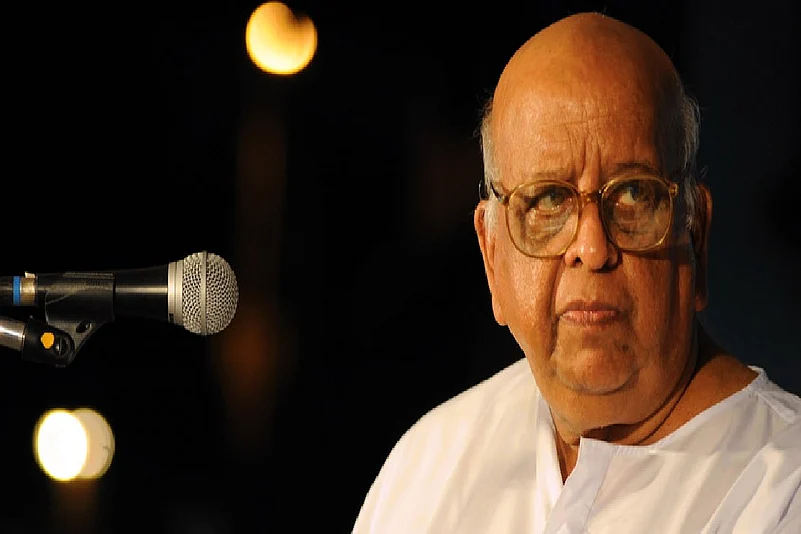Tirunellai Narayana Iyer Seshan was a tough man. Everyone knows that. He was an outstanding Chief Election Commission who used the powers conferred by the Indian Constitution to bring order to the running of elections in the country. The powers were always available to any CEC, but most exercised it with deference to the government in power. Not Seshan.
TN Seshan: Whose Eccentricity And Blinding Religious Belief Often Got Better Of Him
What Seshan did to the election commission – with toughness, unwillingness to bend and sometimes eccentricity – is well documented.

But he was also a very religious person. That too, most people know. He could let his religion blind him to reason. That’s an area not many people know of. In late 1995, Asia Business News (India), the precursor of CNBC TV18, had the opportunity to interview him. I worked with the news outlet then and interacted with him after the interview, at a small canteen housed in the basement where ABNi had its offices.
For some reason, he was in a very loquacious mood, opening up honestly for about three hours to dozens of questions I had for him about his controversial reign as CEC and his personal beliefs. There were some rumours then that Prime Minister Rajiv Gandhi had been in two minds to propose Seshan’s name as the head of the election commission. I asked Seshan about it. He said that Gandhi had earlier given him the ambassadorship of a European country, possibly Belgium.
But then, soon after, the position of the CEC opened up. The prime minister called him in the night to come to his house, Seshan said. He was earlier, in 1989, the Cabinet Secretary in Gandhi’s government. They sat together till 5 am in the morning to discuss what it would entail. Seshan said he was reluctant to accept the post at first because ambassadorship would have been a very cosy job and it was not something you reject with ease.
Gandhi knew Seshan could be tough and unmalleable, and may not do the government’s bidding in a crucial position. According to Seshan, Gandhi prevailed upon him to accept the post, saying elections needed somebody who could be tough and fair. At 5 am, when Seshan was leaving the prime minister abode, Gandhi said he had taken the decision with difficulty. At the door, Gandhi shook his hands and said: “God help the country” showing his ambivalence of letting loose a bulldog on the unsuspecting nation and political parties.
Seshan also recalled the sense of humour that Gandhi had. They would often exchange notes in any given situation, enjoying the narrowmindedness or cussedness of bureaucrats. As an example of Gandhi’s humour, Seshan recounted one meeting in Davos which went on and one and it was clear Gandhi was getting bored.
Soon, Seshan received a note from Gandhi, seated a few seats away, through an aide asking: “Why is Seshan the most intelligent man in this gathering?” As Seshan looked askance at Gandhi, a second note came: “Because he reflects the most,” alluding to his clean-shaving pate. As Seshan made efforts to hold back his guffaw, he saw the prime minister chuckling at his own joke.
What Seshan did to the commission – with toughness, unwillingness to bend and sometimes eccentricity – is history which is well documented. He enjoyed his pow wow with the journalists at the press briefings in the election commission office, but he could also lose his temper very easily. Once when a journalist, known for his eccentric questions, asked Seshan if he was “a man or a Congressman?” the CEC was so angry that he started shouting and asked his security personnel to “throw” the journalist out. Then he walked out of the conference saying he would not ever address journalists again.
It was only after a few of us went and met him in his chamber saying that if one journalist was asked to leave, everyone would, that he relented. He was urged to ignore the question if he did not want to answer, but not to take a precipitous decision like boycotting journalists. He was loathe to relent, but did so after he cooled down.
He was often trailed by controversy. In January 1994, he accepted a Reliance aircraft to attend the Last rites of Sri Kanchi Kamakoti Peetadhipadhi in Kancheepuram. This had always rankled observers. When I put this question to him, he said that he was such a strong devotee of the godman that he would have done anything to reach his funeral. “I would have walked across states, or bribed anyone to reach me there.”
He said when Reliance offered one of their planes to fly him to the funeral he did not think twice. Reliance was the bad boy in the books of many and taking such a favour by the CEC was seen as a black mark against him. Later, in a huff, he wrote a cheque to the Reliance company.
He showed me his ring embedded with stones which he said had been given to him by the godman Sri Sathya Sai Baba “producing it from thin air.” Such was the belief of a man, with a master’s degree in physics, and someone who had shaken the polity of the nation that one could only look at him in jaw-dropping disbelief. He, of course, brooked no challenge to his belief.
- Previous Story
 Marital Rape 'A Social Issue Not Legal', Centre Files Affidavit With SC Against Criminalisation
Marital Rape 'A Social Issue Not Legal', Centre Files Affidavit With SC Against Criminalisation - Next Story
























